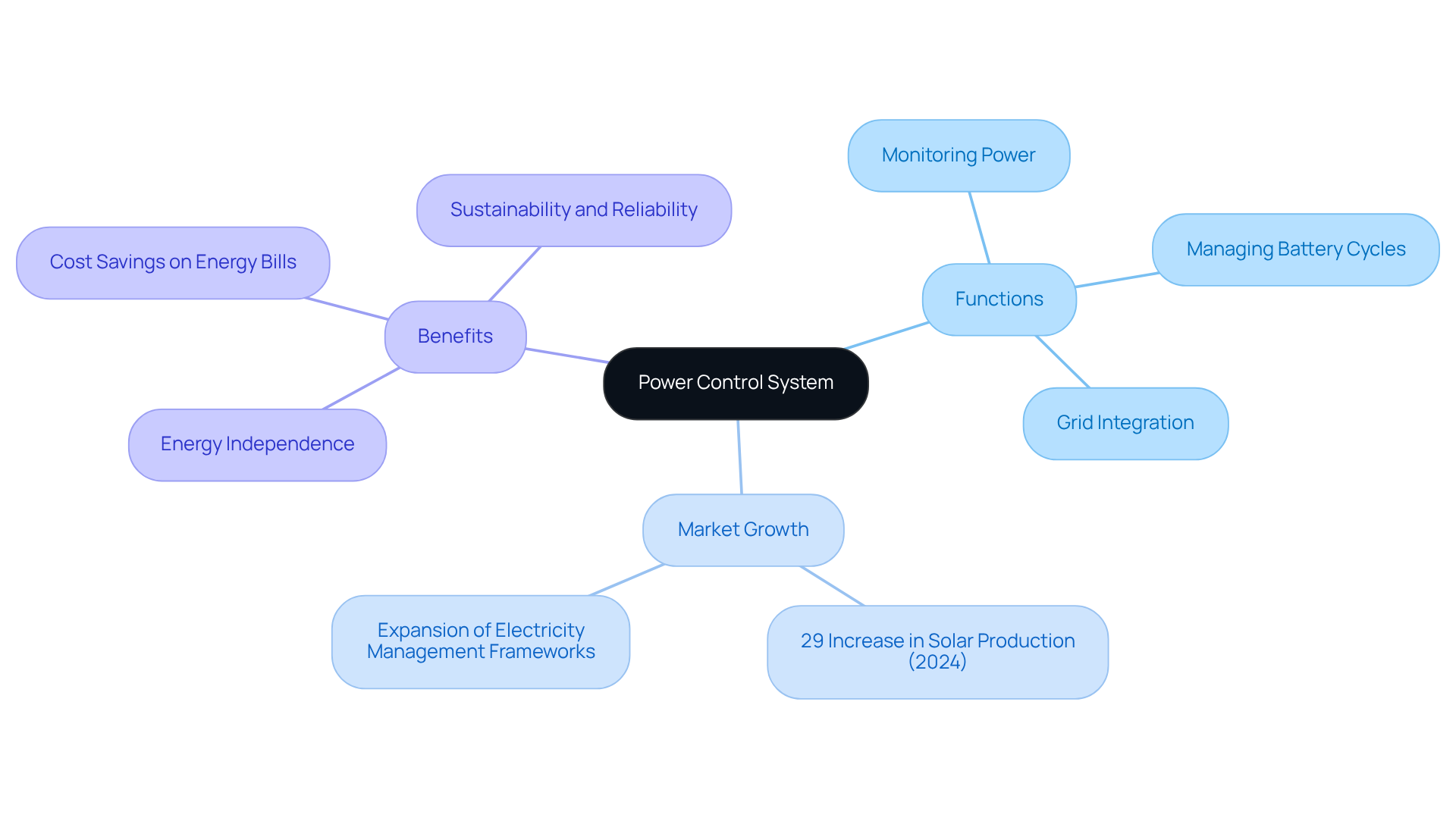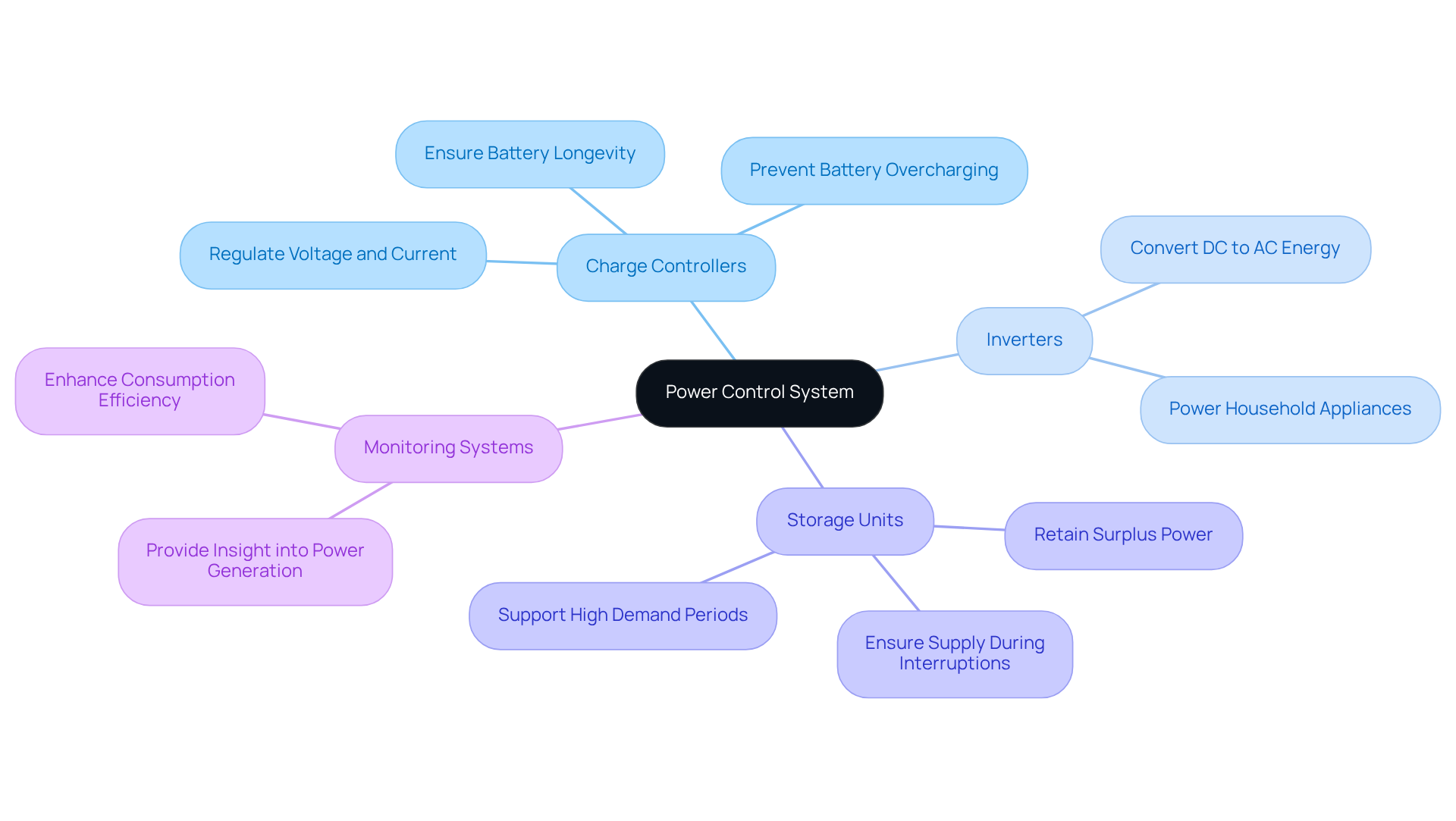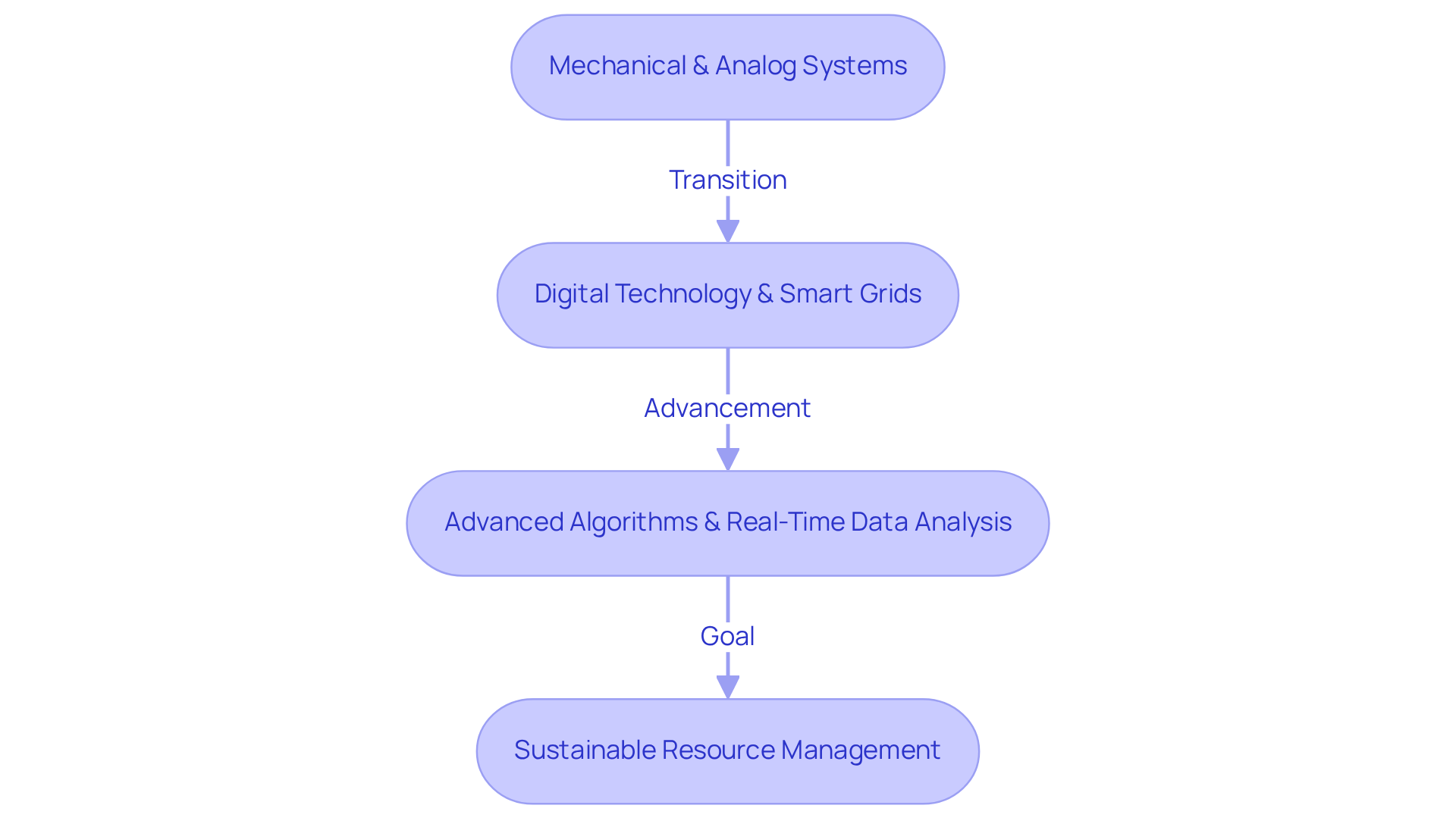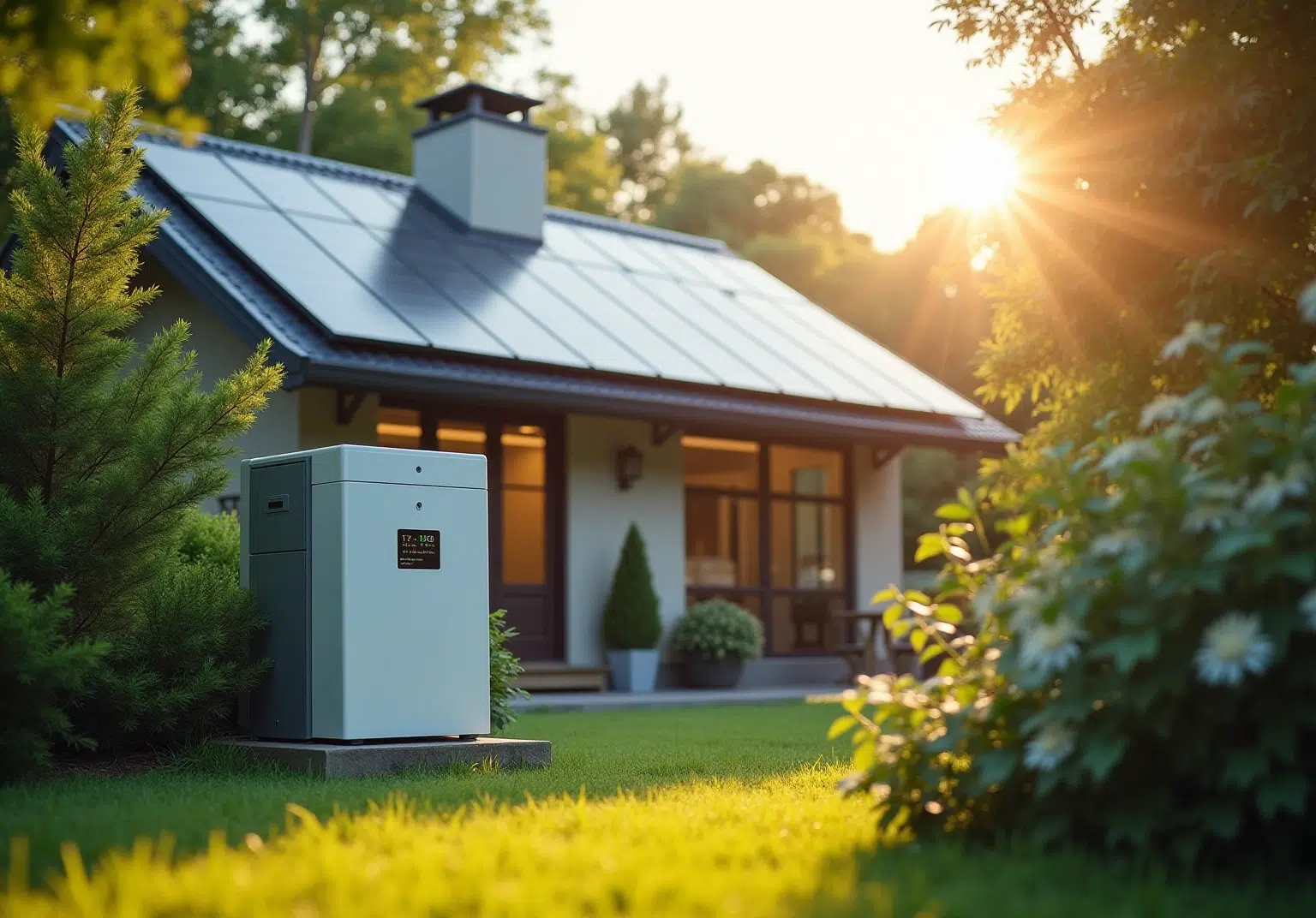Overview
Are you feeling overwhelmed by rising energy bills? Understanding power control systems can be a significant step towards energy independence and sustainability. This article delves into the essential components of these systems and their evolution, particularly in the context of renewable energy management.
Power control systems integrate various technologies—such as charge controllers, inverters, and storage units—to optimize energy distribution and enhance reliability. By doing so, they support homeowners like you in achieving your goals for energy independence and sustainability. Imagine having the ability to manage your energy use effectively, reducing your bills while contributing to a healthier planet.
We understand that navigating this landscape can feel daunting. However, embracing solar energy and power control systems can provide you with the autonomy you desire. Together, we can explore how these solutions not only alleviate financial concerns but also promote a sustainable lifestyle.
Let’s work towards a future where you feel empowered in your energy choices. If you’re ready to take the next step, we’re here to guide you through the process and support you every step of the way.
Introduction
As homeowners, we often find ourselves grappling with the rising complexity of energy management in our modern lives, and it’s understandable to feel overwhelmed. The critical role of power control systems (PCS) becomes evident as these integrated networks not only optimize energy usage from various sources, including renewable options like solar power, but also enhance reliability and ensure compliance with regulatory standards.
With a growing desire for independence from traditional energy sources, we can’t help but wonder: how can the latest advancements in power control technology empower us to achieve sustainability while navigating the challenges of increasing energy costs?
Together, we can explore these solutions and find ways to create a brighter, more sustainable future.
Define Power Control System
We understand that managing energy bills can be a significant concern for homeowners. A power control system offers a nurturing solution, serving as an integrated network that oversees and controls energy output from various sources, including renewable resources like solar panels and storage units such as batteries. This power control system not only guarantees effective power distribution to meet your needs but also ensures stability and compliance with regulatory standards. By managing the flow of electricity, the power control system (PCS) optimizes usage and enhances the reliability of your power supply, particularly in homes where independence from traditional energy sources is increasingly sought.
The market for electricity management frameworks in home solar solutions is expanding swiftly, driven by the rising adoption of solar technology and storage options. In 2024, solar production saw an impressive 29% increase, marking a six-year peak. This growth underscores our collective reliance on integrated power management frameworks to effectively handle the surge of renewable resources.
Imagine setups that combine solar panels with battery storage—these not only empower homeowners with autonomy but also enable you to preserve surplus power for future use. This means you can reduce your dependence on the grid during peak demand periods, creating a more sustainable lifestyle.
Experts emphasize the vital role of the power control system in managing renewable resources. As one industry leader noted, the combination of affordable solar and wind power, supported by flexible grids and storage solutions, is enabling faster decarbonization at lower costs than we ever thought possible.
Key functions of a Power Control System in residential power setups include:
- Monitoring power production and usage
- Managing battery charging and discharging cycles
- Ensuring seamless integration with the grid
These capabilities are crucial for optimizing the effectiveness of renewable power setups and providing you with dependable energy options. Together, we can navigate this journey towards a more sustainable and independent energy future, ensuring that your home remains a sanctuary of comfort and reliability.

Contextualize the Role in Energy Management
We understand that rising energy bills can be a significant concern for homeowners. Power management frameworks (PMF) are here to help, playing a crucial role in resource administration by enabling the smooth incorporation of renewable power sources into the grid. These setups allow for real-time observation and management of power flows, ensuring efficient and sustainable resource usage.
Imagine a home solar arrangement where a power control system (PCS) effectively manages the power produced by your solar panels, directing any surplus either to storage units or back to the grid. This capability not only maximizes your savings but also reduces your dependence on conventional sources, which is increasingly vital as many homeowners aim to lower costs and enhance their energy independence.
In California, around 20% of single-family residences feature integrated power management solutions, indicating a rising trend towards smarter resource management alternatives. Perspectives from energy management experts suggest that these setups not only enhance effectiveness but also empower homeowners to take control of their energy usage, aligning with the larger movement towards sustainable living.
Together, we can embrace these changes for a brighter future. Powercore Electric is dedicated to providing customized solar solutions that improve your autonomy and safeguard your home through roofing enhancements, making it the perfect option for environmentally aware homeowners in both Northern and Southern California. Let’s work towards a sustainable future together!
Examine Key Components and Characteristics
We understand that rising energy bills can be a significant concern for many homeowners. The crucial elements of a power control system—charge controllers, inverters, storage units, and monitoring systems—offer a pathway to energy independence and peace of mind.
- Charge controllers play a vital role by regulating the voltage and current from solar panels, preventing battery overcharging, and ensuring longevity.
- Inverters are essential as they convert the stored direct current (DC) energy into alternating current (AC) energy, which is necessary for your household appliances.
- Storage units, primarily batteries, are crucial for retaining surplus power produced during peak sunlight hours, ensuring a dependable supply during interruptions or periods of high demand.
- Surveillance tools provide immediate insight into power generation and usage, allowing you to enhance your consumption efficiently.
Together, these elements create a unified structure that significantly improves the power control system’s efficiency and reliability, promoting self-sufficiency and contributing to a more robust power grid. Let’s work towards a sustainable future together, where you can feel confident in your energy choices.

Trace the Evolution of Power Control Systems
We understand that energy bills can be a significant concern for many homeowners. The development of authority management frameworks has made substantial strides, particularly as we increasingly rely on sustainable resource options and electric vehicles. Initially, these systems were primarily mechanical and analog, focusing on basic energy flow regulation. However, with the advent of digital technology and smart grid innovations, the power control system’s functionality has transformed dramatically.
Today’s power control system utilizes advanced algorithms and real-time data analysis, enabling sophisticated resource management strategies. This evolution not only facilitates better integration of renewable sources, such as solar power, and electric vehicles but also enhances grid stability and provides homeowners with greater control over their energy consumption.
Companies like Powercore Electric are leading this transition, offering premier residential solar panel installation services in Northern California. Their solutions not only bolster grid stability but also empower homeowners to manage their energy usage effectively, fostering sustainable power solutions and independence.
As technology continues to advance, the power control system is set to play an increasingly vital role in resource management, supporting the transition to a sustainable energy future. Recent innovations, including automated demand response systems and predictive analytics, further optimize energy distribution and consumption patterns, enhancing efficiency and reducing our reliance on fossil fuels.
Together, we can embrace these advancements and work towards a brighter, more sustainable future.

Conclusion
We understand that navigating energy bills can be overwhelming, especially as costs continue to rise. The power control system stands as a cornerstone in the quest for energy independence and sustainability. By integrating various energy sources and optimizing their distribution, these systems not only enhance efficiency but also empower homeowners like you to take charge of your energy consumption. This shift is vital as reliance on renewable resources continues to grow, paving the way for a more stable and self-sufficient energy landscape.
Throughout this article, we’ve explored key components such as charge controllers, inverters, storage units, and monitoring systems, highlighting their essential roles in ensuring effective energy management. The evolution of power control systems from mechanical to sophisticated digital frameworks has further underscored the importance of real-time data analysis and smart technology in managing energy flows. This transformation is crucial for adapting to the increasing demand for renewable energy solutions and achieving greater grid stability.
As we journey toward a sustainable energy future together, embracing these advancements becomes imperative. Homeowners are encouraged to explore integrated power management solutions that not only reduce energy costs but also contribute to a cleaner environment. By investing in power control systems, you can play an active role in shaping a more sustainable tomorrow, fostering energy autonomy and resilience in your home. Together, let’s work towards a future where energy independence is within reach for everyone.


